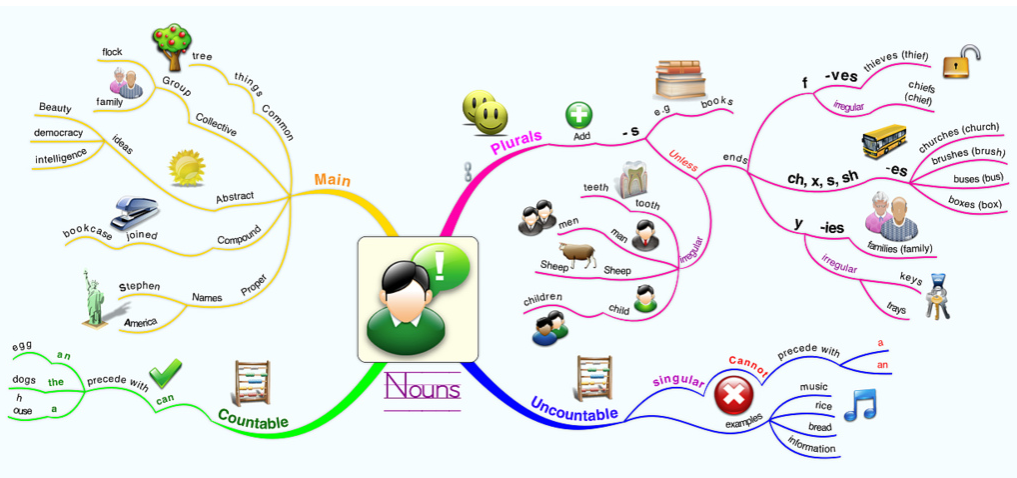2. Countable & uncountable nouns 2
Focus on

Imagen de creación propia
In the last lesson, you learned about countable and uncountable nouns. But did you know that some nouns can be countable OR uncountable, depending on the situation?
Vídeo alojado en YouTube
COUNTABLE AND UNCOUNTABLE NOUNS
1. The difference between countable and uncountable nouns
Countable nouns are the names of separate objects, people, ideas etc which can be counted. We can use numbers and the article a/an with countable nouns; they have plurals. E.g.: a cat, a newspaper, three cats, two newspapers.
Uncountable (or “mass”) nouns are the names of materials, liquids, abstract qualities, collections and other things which we see as masses without clear boundaries, and not as separate objects. We cannot use numbers with uncountable nouns, and most are singular with no plurals. We do not normally use a/an with uncountable nouns, though there are some exceptions (see 11). E.g.: Water (not a water, two waters).
Some determiners can only be used with countable nouns (e.g. many, few); others can only be used with uncountables (e.g. much, little). Compare:
- How many hours do you work?
- How much money do you earn?
2. “Travel and “a journey”, “a piece of advice”
“Travel” and “journey” have very similar meanings, but “travel” is normally uncountable (it means “travelling in general”, and we do not talk about “a travel”), while “journey” is countable (“a journey” is one particular movement from one place to another) and can have a plural: journeys.
- I like travel, but it’s often tiring.
- Did you have a good journey?
Often we can make an uncountable word countable by putting “a piece of” or a similar expression in front of it. Compare:
- He never listens to advice.
- Can I give you a piece of advice?
Here are some other examples of general/particular pairs. (Note that some words that are uncountable in English have countable equivalents in other languages).
Note that when uncountable English words are borrowed by other languages, they may change into countable words with different meanings (for example: “parking” means the activity of parking in general, but in French “un parking” means “a car park”).
|
UNCOUNTABLE |
COUNTABLE |
|
Bread |
A piece/loaf of bread; a loaf; a roll |
|
Chewing gum |
A piece of chewing gum (not a chewing gum) |
|
Equipment |
A piece of equipment; a tool etc |
|
Furniture |
A piece of furniture; a table, chair etc |
|
Information |
A piece of information |
|
Knowledge |
A fact |
|
Lightning |
A flash of lightning |
|
Luck |
A piece/bit/stroke of luck |
|
Money |
A note; a coin; a sum |
|
News |
A piece of news |
|
Publicity |
An advertisement |
|
Rubbish |
A piece of rubbish |
|
Thunder |
A clap of thunder |
|
Traffic |
Cars, etc |
|
Work |
A job; a piece of work |
3. Materials: glass, paper etc
Words for materials are uncountable, but we can often use the same word as a countable noun to refer to something made of the material. Compare:
- I’d like some typing paper
- I’m going out to buy a paper (= a newspaper)
Nouns for materials, liquids etc can be countable when they are used to talk about different types.
- Not all washing powders are kind to your hands.
The same thing happens when we talk about ordering drinks. Compare:
- Have you got any coffee?
- Could I have two coffees? (= cups of coffee)
4. Fruit, rice, wheat, spaghetti, hair; vegetables, peas, grapes, oats
Many things (e.g. rice, grapes) can be seen either as a collection of separate elements or as a mass. Some names for things of this kind are uncountable while others are countable (usually plural).
Uncountable: fruit, rice, spaghetti, macaroni (and other pasta foods), sugar, salt, corn, wheat, barley, maize.
Countable: vegetable(s), bean(s), pea(s), grape(s), oats, lentil(s).
- Fruit is very expensive, but vegetables are cheap.
5. Abstract nouns: time, life, experience
Many abstract nouns can have both uncountable and countable uses, often corresponding to more “general” and more “particular” meanings. Compare:
- Don’t hurry – there’s plenty of time.
- Have a good time.
- There are times when I just want to stop work.
6. Illnesses
The names of illnesses are usually singular uncountable in English, including those ending in –s.
- If you’ve already had measles, you can’t get it again.
7. Country as countable and uncountable
Country as a countable noun means “nation”, “land”.
- Scotland is a cold country.
Country as an uncountable noun means “open land without many buildings”.
- My parents live in nice country near Belfast. (not ...in a nice country...
8. Piece and group words
To talk about a limited quantity of something we can use a word for a piece or unit, together with “of”, before an uncountable noun.
- A piece/bit of cake/bread
- Some pieces/bits of paper/wood
Other words are less general, and are used before particular nouns. Some common examples:
|
a bar of chocolate/soap a drop of water/oil/vinegar a grain of sand/salt/rice/corn/truth |
a loaf of bread a lump of sugar/coal a slice of bread/cake/meat |
A REGIONAL DISH
Your local tourist office has asked your school to make a list of pork dishes and foods which are typical from your area and made with pork. The theme of the project is 'a regional dish'. Remember that it all has to be healthy too! Write the recipe for one of the dishes and also mention the ingredient quantities.
Moving on
Review countable and uncountable nouns by visiting the following website: